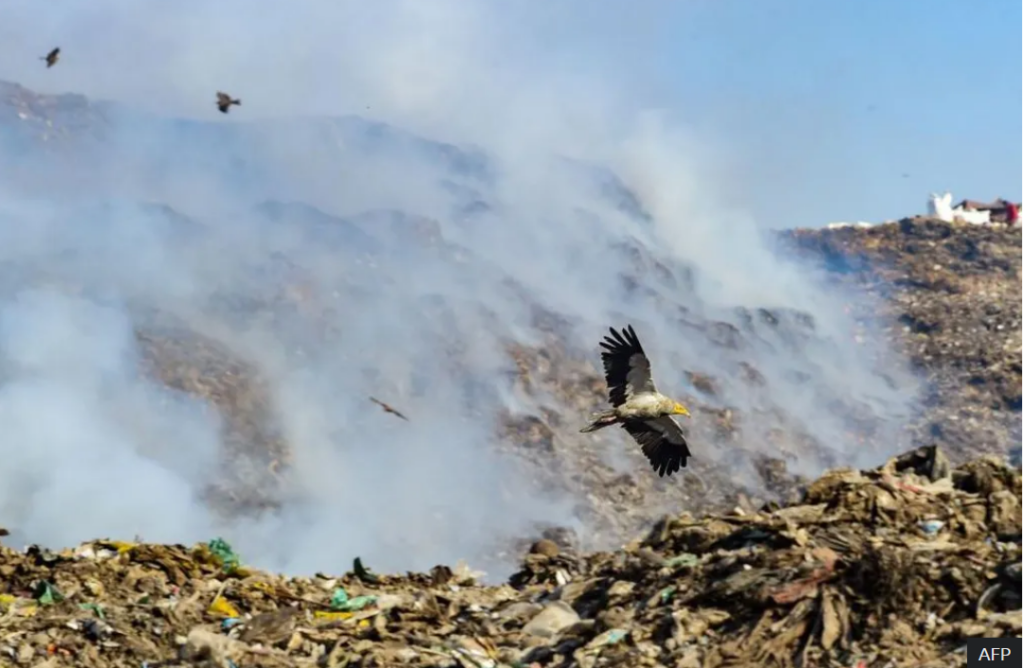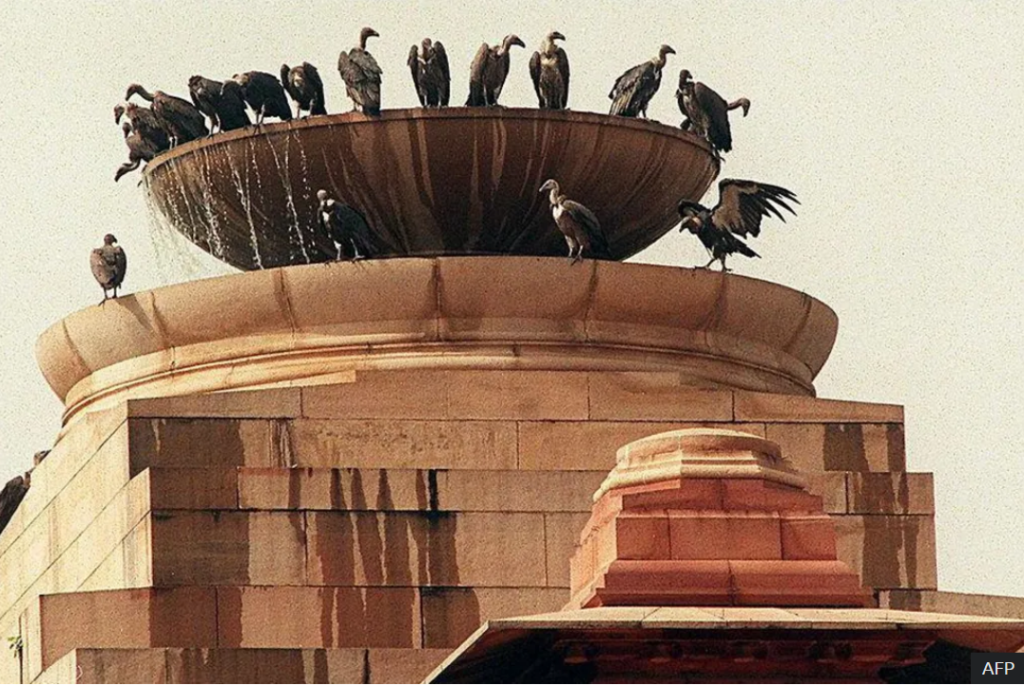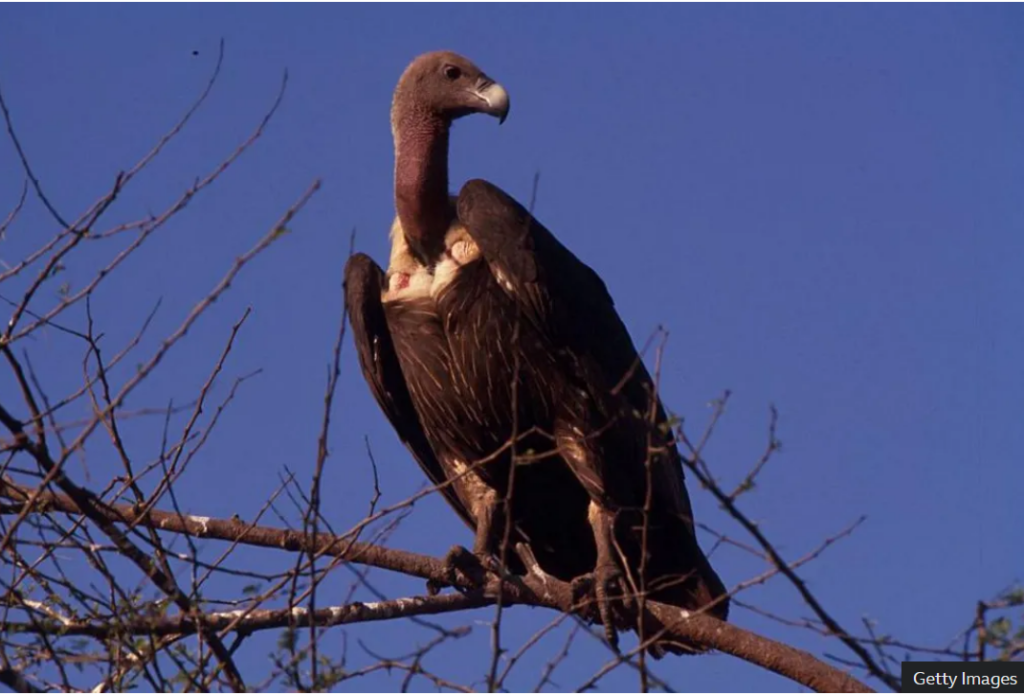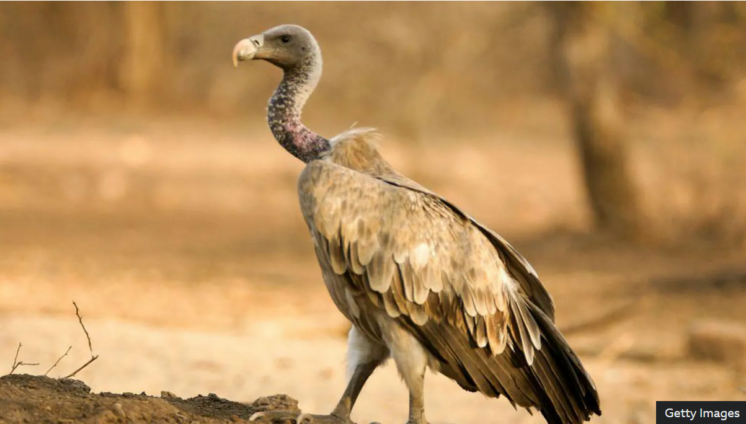Once upon a time, the vulture was an abundant and ubiquitous bird in India.
The scavenging birds hovered over sprawling landfills, looking for cattle carcasses. Sometimes they would alarm pilots by getting sucked into jet engines during airport take-offs.
But more than two decades ago, India’s vultures began dying because of a drug used to treat sick cows.
By the mid-1990s, the 50 million-strong vulture population had plummeted to near zero because of diclofenac, a cheap non-steroidal painkiller for cattle that is fatal to vultures. Birds that fed on carcasses of livestock treated with the drug suffered from kidney failure and died.
Since the 2006 ban on veterinary use of diclofenac, the decline has slowed in some areas, but at least three species have suffered long-term losses of 91-98%, according to the latest State of India's Birds report.
And that’s not all, according to a new peer-reviewed study. The unintentional decimation of these heavy, scavenging birds allowed deadly bacteria and infections to proliferate, leading to the deaths of about half a million people over five years, says the study published in the American Economic Association journal.

“Vultures are considered nature’s sanitation service because of the important role they play in removing dead animals that contain bacteria and pathogens from our environment - without them, disease can spread,” says the study’s co-author, Eyal Frank, an assistant professor at University of Chicago's Harris School of Public Policy.
“Understanding the role vultures play in human health underscores the importance of protecting wildlife, and not just the cute and cuddly. They all have a job to do in our ecosystems that impacts our lives.”
Mr Frank and his co-author Anant Sudarshan compared human death rates in Indian districts that once thrived with vultures to those with historically low vulture populations, both before and after the vulture collapse. They also examined rabies vaccine sales, feral dog counts and pathogen levels in the water supply.
They found that after anti-inflammatory drug sales had risen and vulture populations had collapsed, human death rates increased by more than 4% in districts where the birds once thrived.
The researchers also found that the effect was greatest in urban areas with large livestock populations where carcass dumps were common.

The authors estimated that between 2000 and 2005, the loss of vultures caused around 100,000 additional human deaths annually, resulting in more than $69bn (£53bn) per year in mortality damages or the economic costs associated with premature deaths.
These deaths were due to the spread of disease and bacteria that vultures would have otherwise removed from the environment.
For example, without vultures, the stray dog population increased, bringing rabies to humans.
Rabies vaccine sales rose during that time but were insufficient. Unlike vultures, dogs were ineffective at cleaning rotting remains, leading to bacteria and pathogens spreading into drinking water through runoff and poor disposal methods. Faecal bacteria in the water more than doubled.
“The vulture collapse in India provides a particularly stark example of the type of hard-to-reverse and unpredictable costs to humans that can come from the loss of a species,” says Mr Sudarshan, an associate professor at the University of Warwick and co-author of the study.

“In this case, new chemicals were to blame, but other human activities - habitat loss, wildlife trade, and now climate change - have an impact on animals and, in turn, on us. It’s important to understand these costs and target resources and regulations towards preserving especially these keystone species.”
Of the vulture species in India, the white-rumped vulture, Indian vulture and red-headed vulture have suffered the most significant long-term declines since the early 2000s, with populations dropping by 98%, 95% and 91%, respectively. The Egyptian vulture and the migratory griffon vulture have also declined significantly, but less catastrophically.
The 2019 livestock census in India recorded more than 500 million animals, the highest in the world. Vultures, highly efficient scavengers, were historically relied upon by farmers to swiftly remove livestock carcasses. The decline of vultures in India is the fastest ever recorded for a bird species and the largest since the passenger pigeon’s extinction in the US, according to researchers.
India’s remaining vulture populations are now concentrated around protected areas where their diet consists more of dead wildlife than potentially contaminated livestock, according to the State of Indian Birds report. These continuing declines suggest "ongoing threats for vultures, which is of particular concern given that vulture declines have negatively affected human well-being".
Experts warn that veterinary drugs still pose a major threat to vultures. The dwindling availability of carcasses, due to increased burial and competition from feral dogs, exacerbates the problem. Quarrying and mining can disrupt nesting habitats for some vulture species.
Will the vultures come back? It is difficult to say, though there are some promising signs. Last year, 20 vultures - bred in captivity and fitted with satellite tags and rescued - were released from a tiger reserve in West Bengal. More than 300 vultures were recorded in the recent survey in southern India. But more action is required.
Latest Stories
-
Tumu Community Cup: Soccer Babies to face Nabulo in opener as 24 Hours draw Tarsor
38 seconds -
US Congress moves to block California ban on petrol-only cars
22 minutes -
Modric to leave Real Madrid after Club World Cup
34 minutes -
Four dead, several missing in record Australia flooding
2 hours -
Kid Cudi testifies at Diddy trial about Molotov cocktail attack
2 hours -
‘We’re losing to Kenya and Ivory Coast because of bad tax policy’ – Acting Chamber of Mines boss
3 hours -
Police arrest suspect in gruesome murder of University of Education lecturer in Winneba
3 hours -
Joy News gets results: Nhyiaeso MP constructs a 33-unit classroom block for State Experimental School in Kumasi
3 hours -
‘New taxes could collapse mining sector’ – Chamber of Mines warns
4 hours -
Ghana’s public debt rises to GH¢769.4bn in March 2025
4 hours -
Cedi gains 24.1% to dollar in May 2025 – BoG
4 hours -
Court issues bench warrant for businessman over GH¢149,000
4 hours -
Court sentences car thief to 5 years imprisonment
4 hours -
JHS dropout who returned lost wallet, receives GH₵6K to return to school
5 hours -
Full Text: Isaac Adongo’s statement on economic stability under Mahama’s reset agenda
5 hours

